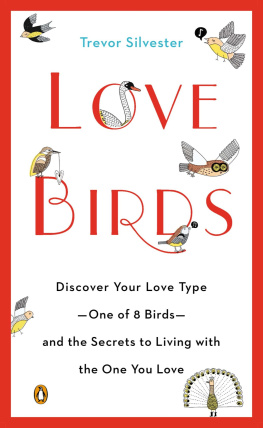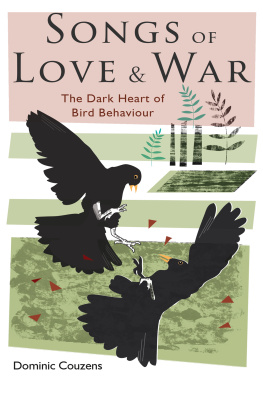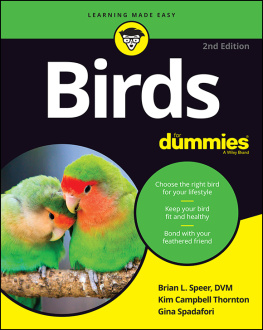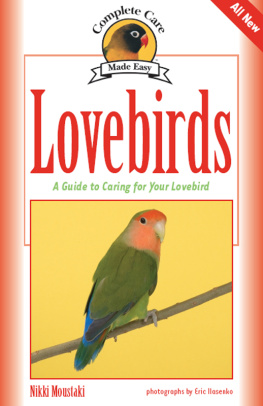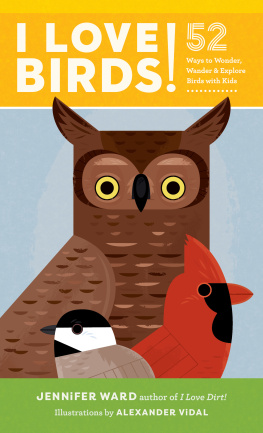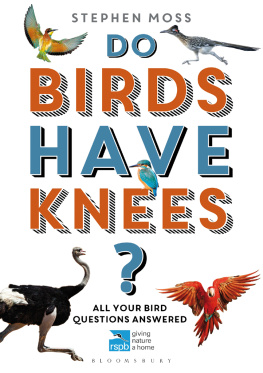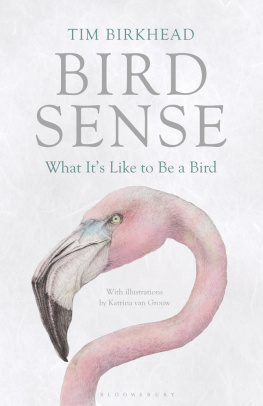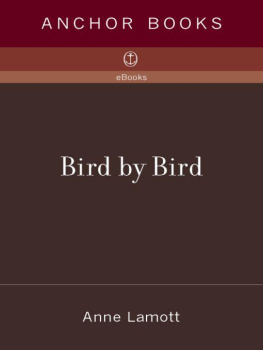Trevor Silvester is a couples therapist with more than twenty years of experience, as well as a longtime birdwatcher. He lives in Norfolk, England.
USA | Canada | UK | Ireland | Australia | New Zealand | India | South Africa | China
Hodder & Stoughton, a Hachette U.K. company, 2013
Penguin supports copyright. Copyright fuels creativity, encourages diverse voices,
promotes free speech, and creates a vibrant culture. Thank you for buying an authorized
edition of this book and for complying with copyright laws by not reproducing, scanning,
or distributing any part of it in any form without permission. You are supporting writers
and allowing Penguin to continue to publish books for every reader.
Silvester, Trevor.
Lovebirds : how to live with the one you love / Trevor Silvestor.
1. Love. I. Title.
Acknowledgements
Becoming an expert in anything usually involves failing at it repeatedly beforehand, and thats certainly true with my relationship history, so it feels appropriate to first thank all the women whove loved me and left me. Ive been fascinated by relationships for a very long time, and Im sure thats partly because I seemed to be so bad at sustaining them. So, along with my thanks goes an apology for my part in the many downfalls. (The rest of it was their fault.)
With the benefit of hindsight, I can see that the hard and painful lessons I learned became ways of helping others, who in turn taught me how to help still more, so Im indebted to my clients whove shared with me the challenges of their relationships as well as being the source of the solutions we found that have made their way into this book.
I wholeheartedly agree with the notion that its better to have loved and lost, but Ive also found its infinitely nicer to love and keep on loving, which is where my wife, Rebecca, comes in. Its not an exaggeration to say that she has been the springboard for everything Ive achieved since I met her, and Ive learned so much about how to make relationships work within the safety of her love. Shes also been very patient in the face of her every foible being met with, Thats going in the book! although theyre not, because the book isnt big enough.
I dont know about other writers, but there comes a stage where I no longer trust my opinion about what Im writing, so its essential to have a team of people I can trust to tell me when its drivel. And they do, if not sometimes with more relish than is entirely healthy. So my thanks go to Jan Gilbertson, Peter Barker, Sue Knight and Ruth Ascroft, great friends to have help from.
Id also like to thank my many friends within the Quest Institute. They start as my students while training to be cognitive hypnotherapists, and many end up as mates. Theyve been an audience for what is in this book for a very long time, so theyll probably be relieved to see it in print at last. Some of them even generously shared stories from their own relationships, which youre going to read later.
Finally, my editors. Charlotte Hardman is the commissioning editor at Hodder who first approached me about the possibility of writing what youre now holding. She clearly has an eye for talent, and Ill be forever grateful for the opportunity. Mark Booth is at the top of the heap when it comes to publishing, and his encouragement and faith have been a lovely accompaniment to the writing of this book.
Introduction
We seem to be obsessed with relationships. Whether its the endless stream of magazine articles detailing the latest celebrity gossip, the buzz in the office about so-and-so and their partner, or the long chats with friends about the state of your union, how we get on with others, and how others get on with others, seems to be an inexhaustible subject of interest.
I spend a good proportion of my working life helping people with their relationships, so Im not surprised. Most people find relationships hard, and yet theyre probably the single most important thing in life to get right. If you live in a supportive, loving state of intimacy you live longer, healthier, happier and more successful lives. No wonder we obsess about how to achieve such a state.
So why do we find it so difficult? After all, the human race has been a two-person relay from the beginning, so youd think wed have it sussed by now. In this book Im going to explain why we find it hard, and how you can turn the things that cause relationships to be difficult into the very things that build the life together youve always wanted.
To do this, I want to share with you what Ive observed in the many couples whove sat in front of me; many going through the kind of pain and distress that is unique to the threatened loss of love, because Ive noticed the same thing again and again: overwhelmingly, most people dont separate because they dont love each other; they do it because they cant live with each other.
Opposites seem to attract... and then drive each other mad. Its taken me years to understand why this is so.
The introduction is (hopefully) the first part of the book that most of you will read, but its the last part that I write, so as I contemplate what youre about to experience set down on these pages, Im feeling a lot of hope: the hope that youll find here something that will make you nod in recognition at yourself and the relationships youve had or are currently having, and learn some things that will enable you to create a fulfilling and rich life with someone you love. I absolutely believe that this is possible, and that the person you currently love is likely to be someone you can learn to live happily with.
There is, however, always a danger when you try to put people into boxes and describe them. We all know each of us is unique so cant be totally predictable, but we do have preferences in the way we see things that are identifiable in many situations like whether you tend to be left- or right-wing in politics, or prefer the company of lots of people or something more intimate. So Im going to talk about the tendencies I see most often causing the differences between people that we trot out as reasons for a break-up: They didnt understand me; They were always winding me up; They were too lazy/maniacal/anal/fluffy/undependable/boringly dependable... The list may seem endless, but the differences that drive them arent.
By reading this book, I intend to get you thinking about how you relate to people and to teach you how to do it better. While its focus is on intimate relationships, the benefits will be far broader because if you can learn to relate clearly with your partner, then your friends, colleagues and bosses will be a doddle.
The differences between people that Im going to be focusing on are the ones that fly largely beneath the radar. Im expecting you to nod in recognition at them, and wonder how you never realised their importance in the daily impact on the way you live your life and run, or ruin, your relationships. Im going to teach you to identify them in you and your partner, and how to turn how they cause you problems into what brings you closer.

